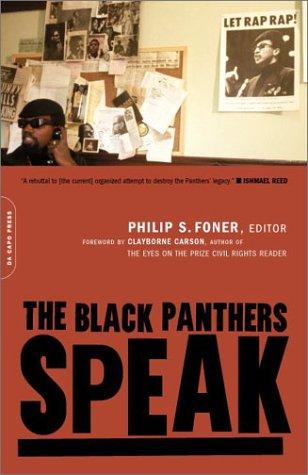Paperback, 328 pages
English language
Published Aug. 6, 2002 by Da Capo Press.

Paperback, 328 pages
English language
Published Aug. 6, 2002 by Da Capo Press.
From its founding by Huey P. Newton and Bobby Seale in 1966, the Black Panther Party has aroused year, hope, misunderstanding, pride and vilification. In The Black Panthers Speak, the best single source of original material on and by the Black Panther Party, Philip S. Foner separates philosophy from propaganda. The essential documents of the Party are all here, including "What We Want, What We Believe," Newton and Seale's seminal treatise, which became a standard to gauge society's progress. With their passionate demands, Seale and Newton succinctly captured the revolutionaly spirit and aspirations of many American blacks in the 1960s and 1970s. Foner includes illuminating excerpts from The Black Panther, the newspaper that proved so instrumental in the Party's rapid growth and development. His careful selection of cartoons, original flyers, and articles by members of various ranks allows a glimpse inte the black consciousness of the late 1960s, as do …
From its founding by Huey P. Newton and Bobby Seale in 1966, the Black Panther Party has aroused year, hope, misunderstanding, pride and vilification. In The Black Panthers Speak, the best single source of original material on and by the Black Panther Party, Philip S. Foner separates philosophy from propaganda. The essential documents of the Party are all here, including "What We Want, What We Believe," Newton and Seale's seminal treatise, which became a standard to gauge society's progress. With their passionate demands, Seale and Newton succinctly captured the revolutionaly spirit and aspirations of many American blacks in the 1960s and 1970s. Foner includes illuminating excerpts from The Black Panther, the newspaper that proved so instrumental in the Party's rapid growth and development. His careful selection of cartoons, original flyers, and articles by members of various ranks allows a glimpse inte the black consciousness of the late 1960s, as do the voices of Panther leaders Eldridge Cleaver, David Hilliard, Fred Hampton, and Erica Huggins.